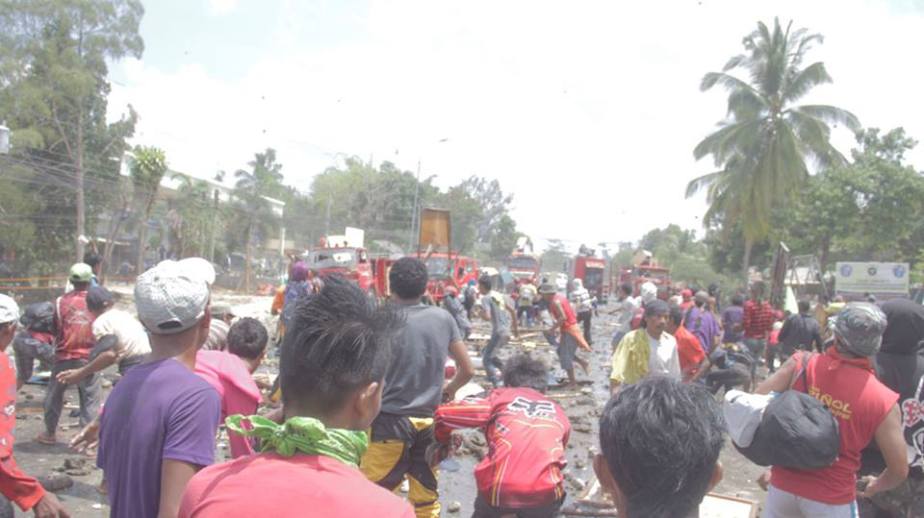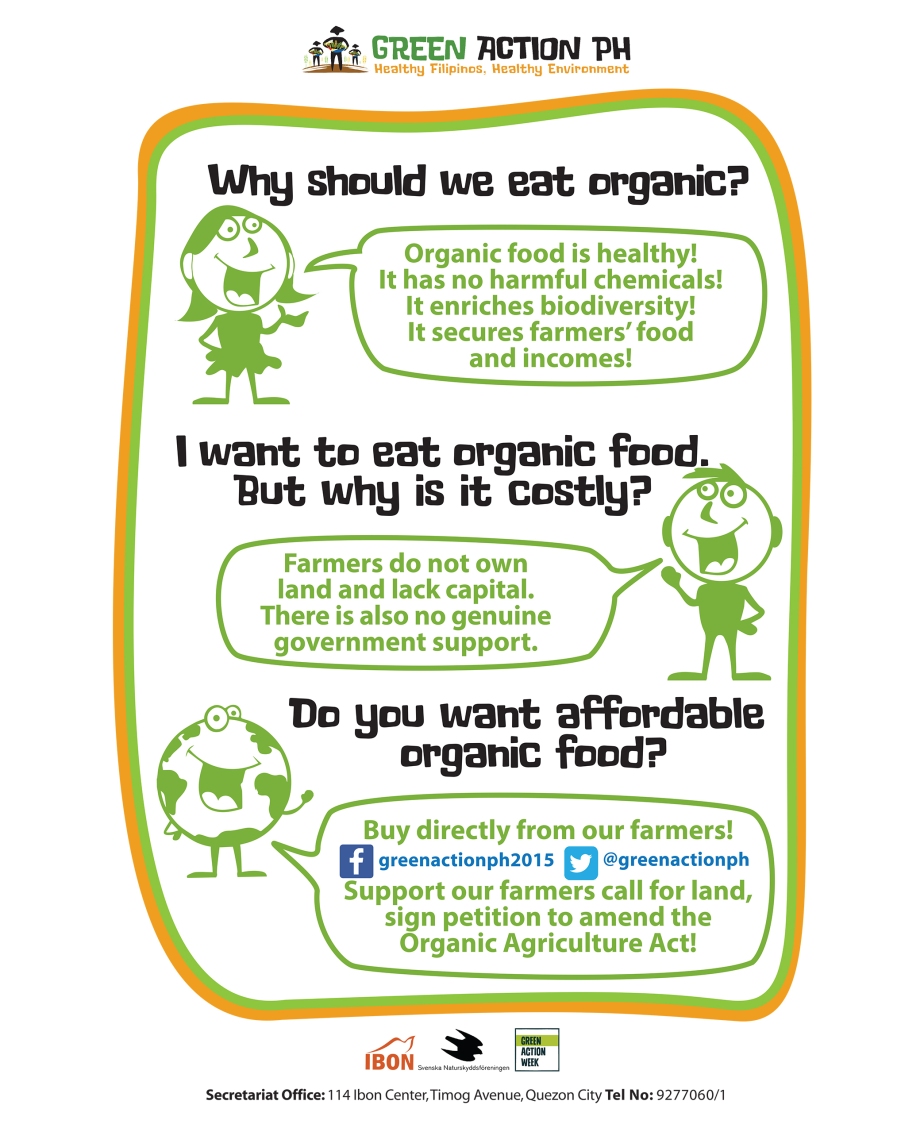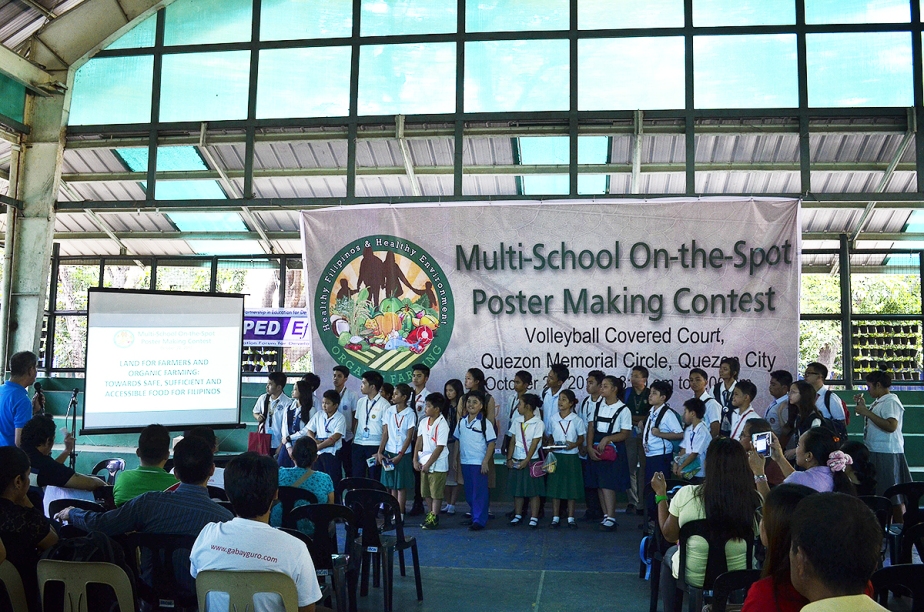The Supreme Court (SC) ruling to permanently stop the field testing of the controversial Bt Talong and voiding the Department of Agriculture Administrative Order (AO) No. 8, series of 2002 drew mixed reactions. The SC on December 8, 2015 upheld the decision of the Court of Appeals in May 2013 which granted the Writ of Kalikasan to Greenpeace Southeast Asia, Magsasaka at Siyentipiko para sa Pag-unlad ng Agrikultura (MASIPAG) and other petitioners.
A number of Filipino scientists, students and institutions criticized the banning of Bt Talong field testing as putting an end to scientific research. On the other hand, sustainable agriculture advocates encourage more research and development funds channeled to ecological friendly technologies.

Teodolo Badillo, from Molave, Zamboanga del Sur, one of the 49 Rice Achiever awardees recognized by the national office of the Department of Agriculture (DA) and also chosen as Outstanding Organic Farmer in 2012. Organic farms use buffer zones – trees around their farms, filtration canal to protect integrity of their farms from chemicals in nearby farms.

Small organic farmers of San Roque Farmers’ Association (SRFA) in Aloguinsan, Cebu show their stock of different rice seeds. They breed their own rice lines and make bio-pesticides and fertilizers from indigenous materials found in their immediate environment.

Small farmers practice bayanihan (collective farming) in organic rice across the country. Shown in this picture is an organic rice farm in Bgy. Orong, in Kabankalan town, Negros Occidental which used to be part of the 50-hectare Hacienda Galang.

This organic farm in Aloguinsan, Cebu is inter-cropped with white corn, cassava and coconut trees.
The University of the Philippines League of Agricultural Biotechnology Students (UP LABS) in a statement said the SC ruling would adversely affect modern biotechnology research and the agricultural industry. UP LABS argued that “The principle cited by the SC is ‘unfounded’ because it is based on a misnomer that only naturally-produced food is safe, whereas those manipulated by man are assumed to be dangerous”.
The group further said “We are firmly convinced that the precautionary principle isn’t in favor of any scientific advances that are being pushed in our country, since we all know that everything we do involves risks and the only way to know that something is safe is through tests and studies”.
The International Rice Research Institute (IRRI) on the other hand expressed concern over the SC decision. One of the GMO crops to be affected is the Golden Rice variety of rice genetically engineered by IRRI.
Fr. Benny Beltran of Philippine Sustainability Challenge (PSC) based at the Sacred Heart Parish in Quezon City said that “Scientific research is always welcome for as long as it upholds the peoples’ well-being. We are not against the science of GMO per se, but they have to show us that GMOs are safe and beneficial to the people and the environment in the long term”.
Green Action PH, a national network of consumers and producers including local government units (LGUs), scientists, academe, religious organizations advocating for sustainable production and consumption, hailed the decision a victory for farmers and consumers. “The SC ruling is a welcome development especially in light of the growing concerns on the contribution of conventional chemical farming to climate change with the increasing use of agri-chemicals. Despite claims that GMO commercialization in the country will reduce pesticides use, it has in fact increased according to farmers’ experience. Farmers complain of its effects on biodiversity and on their health and incomes”, says Mr. Shen Maglinte, Deputy Executive Director of Sibol ng Agham at Teknolohiya (SIBAT, Inc.), and spokesperson of Green Action PH.
Bt Corn Promises unmet
Bt Corn, the first GMO crop commercialized in Philippine farms in 2003 promised increased yields and better incomes for small corn farmers – the same promise being offered with the commercialization of Bt Talong. However, research-based evidence show how the adoption of Bt Corn and eventually other strains of the GMO corn by Filipino farmers led them to incur bigger debts and drove them to deeper poverty with many of them losing their rights to their lands.
Dr. Chito Medina, MASIPAG National Coordinator cites the research done by MASIPAG with IBON Foundation published in 2013 – “Socio-economic Impacts of Genetically Modified Corn in the Philippines, where 166 small corn farmers were interviewed through focus group discussion in 12 case areas across the country. “In all the 12 case areas, farmers have incurred negative returns and most of them are indebted to their financier-traders”, shared Dr. Medina.
“Other than indebtedness (net-loss in incomes), small corn farmers also suffered loss of ownership of their lands and control over their seeds, food insecurity from loss of biodiversity including heavy soil erosion, and, threats to health. Over time, small corn farmers said they have to put in additional sacks of fertilizers to maintain yields, and likewise, new weeds and pests resistant to the GMO corn have infested their GM crops forcing them to apply more and more pesticides”, added Medina.
A staff of the Municipal Environment Office in Bukidnon shared that they cannot grow seedlings near farmers planted to GM Corn because the round-up ready herbicide spray farmers use to kill weeds decimated vegetation within the perimeter of GM Corn farms. While it is standard operating procedure, the Philippine government has not done any post release monitoring in the more than a decade of GM Corn commercialization in the country, the MASIPAG study revealed.
Sustainable agriculture, a viable alternative
“The basic practices of sustainable farming technologies would be much more helpful to farmers as these are least costly, environmentally friendly and healthy”, said Mr. Maglinte.
“Basically, poor crop yield and disease-prone crops is caused by poor soil fertility especially ones that turned acidic after years of being saturated with chemical fertilizers or being overused without substantive replenishment of organic matter, necessary nutrients and micro elements. Poor seed quality is also one contributing factor especially ones that are not ecologically nurtured and improved. Hybrid seeds are not steady with yield declining over time unless you feed the crops with synthetic chemicals”, further explains Maglinte.
Aside from using chemical depended hybrid and GMO seeds, the problem on productivity and incomes faced by farmers is due to mono-cropping. Mono-cropping, a common practice to achieve high yield to meet market demands, renders the crop highly vulnerable to pest infestation. With a single crop, pest could not find other crops to feed on and thus concentrate on preying on the single crop with great economic damage and loses as a result. Using a large amount of pesticides to control the infestation only worsens the situation as farmers would have to spend more buying pesticides and its residues contaminates the soil and nearby water systems.
Mono-cropping of GM Corn has led to infestation of banded leaf and sheath blight (BLSB) on 9,688 hectares of corn farms in North Cotabato in 2011. The disease was traced to the no-till farming due to the incessant use of Roundup herbicide. Corn farmers have been advised to go back to deep ploughing – a sustainable agriculture practice abandoned by farmers with the use of round-up ready GM Corn, according to the MASIPAG study.
“Farmers should practice crop diversification instead”, says Maglinte. “They should reinvigorate the health of the soil by stopping chemical fertilizer use. They should substitute this instead with bio-fertilizer, putting more organic matter into the soil by decomposing farm wastes and residues such as leaves, animal wastes available in the area. Planting of leguminous crops like mungbean, cowpeas improves soil fertility as their root system has features and capacities of storing and fixing these nitrogen from the atmosphere and brings these back to the soil. Crop diversification provides pest with varieties of habitation, with some crops with repellent properties warding off harmful pests and increase the mix population of good and bad insects. The prey-predator relationship of insects is enhanced.”
Two recent studies, “Food Security and Farmer Empowerment: A Study on the Impacts of Farmer-led Sustainable Agriculture in the Philippines” by MASIPAG, and “Green Works: The Viability of Organic Farming in the Philippines by IBON Foundation provided ample evidence how the practice of sustainable agriculture improved farmers incomes and provided food security and improved nutrition to small organic farmers.
MASIPAG, SIBAT and other similar non-government organizations advocating sustainable agriculture practices and technologies are transferring knowledge to farmers, now farmer-scientists, on sustainable agriculture and technology. “The science of agriculture is not only confined in the four walls of laboratories and classrooms. It is best done on the field by the farmers”, said Dr. Medina.
Farmer-scientists trained by MASIPAG and SIBAT breed their own rice lines. There are now 1,313 traditional rice varieties collected and maintained by MASIPAG of which 1,288 are MASIPAG rice and 506 are farmer-bred rice. These seeds are shared among thousands of organic farmers across the Philippines.
More research on sustainable farming needed
“Eggplants are one the most common crops of the country that can grow almost anywhere we often familiarly see even in most household front and backyards. In vegetable cultivation, it’s better to plant other crops side by side with eggplants so that pest need not focus on eggplants alone. Simple bio-sprays, healthy soil, good locally-improved seeds, bio-fertilizers are just the basic elements needed to grow crops such as eggplant. Hence, creating a GMO Talong or eggplant (Bt Talong) is grossly unnecessary to produce good harvest as many practitioners of organic farming could prove” shared Maglinte.
“Instead of investing time, knowledge and money on research and development for chemical farming, our scientists, the DA and other agencies involved in research and development in agriculture should instead channel their efforts on finding ways to enhance sustainable agriculture practices in the country especially organic farming which is the viable long-term option to ensure food security, improved and revitalized bio-diversity, better health and nutrition for Filipinos and improved livelihood and incomes for the millions of small Filipino farmers”, added Maglinte.
“In general, the food production system in the Philippines, especially corporate farming does not care about the health of those who eat it. The problem is that profit is prioritized over peoples’ well-being”, said Fr. Beltran.#eof#





























